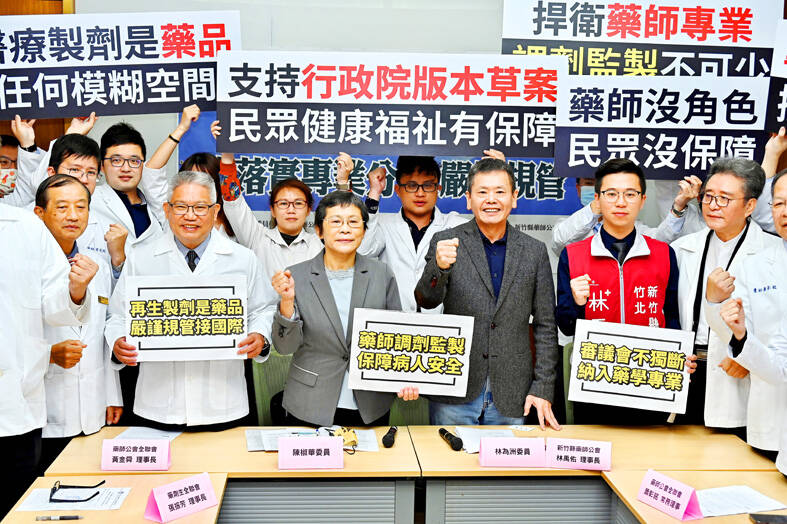The government should help doctors and pharmacists resolve disputes over regenerative medicine, lawmakers and medical groups said yesterday, a day before the legislature was expected to begin reviewing two bills concerning the emerging medical field.
The Social Welfare and Environmental Hygiene Committee is to discuss the proposed laws — the regenerative medicine and the regenerative medicine pharmaceutical manufacturing bills — starting today.
The field seeks to regenerate or replace cells, organs and tissue to restore function using artificial organs made of biological materials.

Photo: Tu Chien-jung, Taipei Times
A panel of experts in medicine, drugs, ethics and law should be convened to help forge a consensus between the Taiwan Medical Association and the Federation of Taiwan Pharmacists’ Associations, Chinese Nationalist Party (KMT) Legislator Lin Wei-chou (林為洲), a member of the committee, told a news conference at the legislature in Taipei.
The federation believes that the Food and Drug Administration (FDA) should retain authority to approve regenerative medicine products, as it does for any other pharmaceutical product, Lin said.
The association says that as the products are sufficiently different from conventional medications, use authorization should be controlled by a proposed regenerative medicine evaluation board, he said.
Regenerative medicine is an important rising field and lawmakers would like to pass the bills as soon as possible, but the government must end the dispute to avoid public confusion that could arise from the disagreement between the medical groups, he said.
The Ministry of Health and Welfare and the Ministry of Education should create a platform to oversee the education, training and certification of professionals involved in regenerative medicine, Lin said.
The measures, which would ensure proper division of labor and patient safety, could be implemented administratively after passage of the legislation, he said.
The products fit Taiwan’s legal definition of drugs and most regulators around the world agree that they should be regulated as such, federation president Huang Jin-shun (黃金舜) said.
Keeping expertise in technological development and manufacturing separate would facilitate efficiency in the division of labor and certifications to manage a lack of certainty and consistency in effects of regenerative medicine, Huang said.
Most overseas regulators have defined the products as drugs, as the classification allows for more rigorous standards to be enforced in their manufacture, association spokeswoman Chang Wen-ching (張文靜) said.
As the cultivation of live cells in regenerative medicine is more complex than making conventional drugs, the regulatory standards must be at least equal to those of drugs, Chang said.
Additional reporting by CNA

The Ministry of Education (MOE) is to launch a new program to encourage international students to stay in Taiwan and explore job opportunities here after graduation, Deputy Minister of Education Yeh Ping-cheng (葉丙成) said on Friday. The government would provide full scholarships for international students to further their studies for two years in Taiwan, so those who want to pursue a master’s degree can consider applying for the program, he said. The fields included are science, technology, engineering, mathematics, semiconductors and finance, Yeh added. The program, called “Intense 2+2,” would also assist international students who completed the two years of further studies in

Former president Tsai Ing-wen (蔡英文) departed for Europe on Friday night, with planned stops in Lithuania and Denmark. Tsai arrived at Taiwan Taoyuan International Airport on Friday night, but did not speak to reporters before departing. Tsai wrote on social media later that the purpose of the trip was to reaffirm the commitment of Taiwanese to working with democratic allies to promote regional security and stability, upholding freedom and democracy, and defending their homeland. She also expressed hope that through joint efforts, Taiwan and Europe would continue to be partners building up economic resilience on the global stage. The former president was to first

Taiwan will now have four additional national holidays after the Legislative Yuan passed an amendment today, which also made Labor Day a national holiday for all sectors. The Chinese Nationalist Party (KMT) and Taiwan People’s Party (TPP) used their majority in the Legislative Yuan to pass the amendment to the Act on Implementing Memorial Days and State Holidays (紀念日及節日實施辦法), which the parties jointly proposed, in its third and final reading today. The legislature passed the bill to amend the act, which is currently enforced administratively, raising it to the legal level. The new legislation recognizes Confucius’ birthday on Sept. 28, the

MORE NEEDED: Recall drives against legislators in Miaoli’s two districts and Hsinchu’s second district were still a few thousand signatures short of the second-stage threshold Campaigners aiming to recall Chinese Nationalist Party (KMT) legislators yesterday said they expect success in 30 out of 35 districts where drives have passed the second-stage threshold, which would mark a record number of recall votes held at once. Hsinchu County recall campaigners yesterday announced that they reached the second-stage threshold in the recall effort against Legislator Lin Szu-ming (林思銘). A total of 26,414 signatures have been gathered over the past two months, surpassing the 10 percent threshold of 23,287 in Hsinchu County’s second electoral district, chief campaigner Hsieh Ting-ting (謝婷婷) said. “Our target is to gather an additional 1,500 signatures to reach